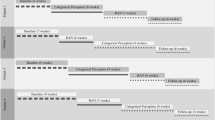Abstract
The goal of the present study was to evaluate the effectiveness of the Auditory Discrimination in Depth Program (ADD) in remediating the analytic decoding deficits of a group of severe dyslexics. A group of ten severely dyslexic students ranging in age from 93 to 154 months were treated in a clinic setting for 38 to 124 hours (average of 65 hours). Pre- and post-treatment testing was done with the Woodcock Reading Mastery Test and the Lindamood Auditory Conceptualization to assess changes in phonological awareness and analytic decoding skills. Results revealed statistically significant gains in phonological awareness and analytic decoding skills.
Similar content being viewed by others
References
Ball, E. W. and Blachman, B. A. 1988. Phoneme segmentation training: Effect on reading readiness.Annals of Dyslexia 38:208–225.
Bradley, L. and Bryant, P. E. 1978. Difficulties in auditory organization as a possible cause of reading backwardness.Nature 221:746–747.
Bradley, L. and Bryant, P. 1985.Rhyme and Reason in Reading and Spelling. Ann Arbor: University of Michigan Press.
Coles, G. S. 1987.The Learning Mystique: A critical look at “learning disabilities.” New York: Pantheon.
Frith, U. 1985. Beneath the surface of developmental dyslexia.In K. Patterson, J. Marshall, and M. Coltheart (eds.).Surface Dyslexia (pp. 301–330). London: Erlbaum.
Gough, P. and Tunmer, W. 1986. Decoding, reading, and reading disability.Remedial and Special Education, 7:6–10.
Liberman, I. Y. 1987. Language and Literacy: The obligation of the Schools of Education.In R. F. Bowler (ed.).Intimacy with Language pp. 1–9. Baltimore, MD: The Orton Dyslexia Society.
Liberman, I. Y., Shankweiler, D., and Liberman, A. M. 1989. The alphabetic principle and learning to read.In D. Shankweiler and I. Y. Liberman (eds.). Phonology and Reading Disability: Solving the reading puzzle. Ann Arbor, MI: University of Michigan Press.
Lindamood, C. H. and Lindamood, P. C. 1979.Lindamood Auditory Conceptualization Test. Allen, TX: DLM/Teaching Resources.
Lindamood, C. H. and Lindamood, P. C. 1975.Auditory Discrimination in Depth. Allen, TX: DLM/Teaching Resources.
Lovett, M. W., Benson, N. J., and Olds, J. In press. Individual difference predictors of treatment outcome in the remediation of specific reading disability.Learning and Individual Differences.
Lundberg, I., Frost, J., and Peterson, O. 1988. Effects of an extensive program for stimulating phonological awareness in pre-school children.Reading Research Quarterly 23:263–284.
Lundberg, I., Olofsson, A., and Wall, S. 1980. Reading and spelling skills in the first school years predicted from phonemic awareness skills in kindergarten.Scandinavian Journal of Psychology 21:159–173.
Lyon, G. R. 1985. Educational validation studies.In B. P. Rourke (ed.).Neuropsychology of Learning Disabilities. pp. 228–253. New York: Guslford Publications, Inc.
Ogden, S., Hindman, S., and Turner, S. D. 1989. Multisensory programs in the public schools: A brighter future for LD children.Annals of Dyslexia 39:247–267.
Perfetti, C. A. 1985.Reading Ability. New York: Oxford University Press.
Roth, S. F. and Beck, I. L. 1987. Theoretical and instructional implications of the assessment of two microcomputer word recognition programs.Reading Research Quarterly 22:197–218.
Snowling, M. and Hulme, C. 1989. A longitudinal case study of developmental phonological dyslexia.Cognitive Neuropsychology 6:379–401.
Snowling, M., Stackhouse, J., and Rack, J. 1986. Phonological dyslexia and dysgraphia—a developmental analysis.Cognitive Neuropsychology 3:309–339.
Stanovich, K. E. 1982. Individual differences in the cognitive processes of reading I: word decoding.Journal of Learning Disabilities 15:485–493.
Stanovich, K. E. 1988. Explaining the differences between the dyslexic and the garden-variety poor reader: The phonological-core variable-difference model.Journal of Learning Disabilities 21:590–604.
Stanovich, K. E., Cunningham, A. E. and Feeman, D. J. 1984. Relation between early reading acquisition and word decoding with and without context: A longitudinal study of first grade children.Journal of Educational Psychology 76:668–677.
Torgesen, J. K. In press. Cross-age consistency in phonological processing.In S. Bradey and D. Shankweiler (eds.).Phonological Processes in Literacy: A tribute to Isabelle Y. Liberman. Hillsdale, NJ: Lawrence Earlbaum Assoc.
Torgesen, J. K. and Morgan, S. 1990. The effects of two types of phonological awareness training on word learning in kindergarten children. Manuscript submitted for publication, Florida State University, Tallahassee, FL.
Torgesen, J. K., Rashotte, C. A., Greenstein, J., Houch, G., and Portes, P. 1987. Academic difficulties of learning disabled children who perform poorly on memory span tasks.In H. L. Swanson (ed.).Memory and Learning Disabilities: Advances in Learning and Behavioral Disabilities. pp. 305–333. Greenwich, CT: JAI Press.
Wagner, R. K. and Torgesen, J. K. 1987. The nature of phonological processing and its causal role in the acquisition of reading skills.Psychological Bulletin 101:192–212.
Williams, J. P. 1980. Teaching decoding with an emphasis on phoneme analysis and phoneme blending.Journal of Educational Psychology 72:1–15.
Woodcock, R. W. 1973.Woodcock Reading Mastery Tests. Circle Press, MN: American Guidance Service.
Author information
Authors and Affiliations
Rights and permissions
About this article
Cite this article
Alexander, A.W., Andersen, H.G., Heilman, P.C. et al. Phonological awareness training and remediation of analytic decoding deficits in a group of severe dyslexics. Annals of Dyslexia 41, 193–206 (1991). https://doi.org/10.1007/BF02648086
Issue Date:
DOI: https://doi.org/10.1007/BF02648086



